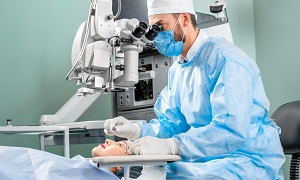Best Doctors in India for Glaucoma treatment
- Opthalmologist, Chennai, India
- Over 26 years’ experience
- Apollo Hospitals Greams Road, Apollo Spectra Hospital Chennai-Alwarpet
Profile Highlights:
- Dr. Pratik Ranjan Sen is a specialist in Ophthalmology and serves as an Ophthalmologist – Consultant at Apollo Hospitals, Chennai.
- He has performed over 8000 Retinal detachment and other Vitreo retinal disorder surgeries.
- Dr. Pratik Ranjan Sen considers his profession a mission and is dedicated to his work. Due to this, he has gained enough trust and recommendations from his patients.
- Ophthalmologist, Chennai, India
- Over 21 years’ experience
- Apollo Hospitals Greams Road
Profile Highlights:
- Dr. Viswanathan P is one of the best eye surgeons in India having an overall experience of 21 years.
- He is a qualified doctor from the Tamil Nadu University of India and possesses a degree in MBBS and MS.
- One can visit him for routine eye check-ups or retina examinations and services like eye surgery, retina surgery, cataract surgery, etc.
- Ophthalmologist, Gurugram, India
- Over 13 years’ experience
- Medanta-The Medicity, Gurgaon
Profile Highlights:
- Dr. Svati Bansal is an esteemed consultant and practitioner of ophthalmology in Gurugram.
- Her specialty lies in orbit and oculoplasty, ocular oncology, ocular trauma, and neuro-ophthalmology.
- She has fellowships in neuro-ophthalmology and ocular motility, oculoplasty, and facial aesthetics, and ocular oculoplastic and ocular oncology.
- Top Ophthalmologist | Fortis Hospital, Mulund, Mumbai
- 10+ Years Experience
- Fortis Hospital Mulund Mumbai
Profile Highlights:
- Dr. Amit Jain is an experienced Ophthalmologist based in Mumbai, who specializes in treating patients with eye issues, particularly those related to Vitreo-Retina, Uvea, and ROP.
- He is an expert in employing the most recent techniques in eye surgery to address conditions like diabetes that damage the eyes and correct issues with the back of the eye.
- With more than 10 years of expertise, Dr. Amit Jain has made a name for himself as a leading expert in the field of eye care.
- He completed his medical training in Ophthalmology at the Dr. Rajendra Prasad Centre for Ophthalmic Sciences at AIIMS in New Delhi, a renowned institute for eye treatment. Later, he went on to pursue long term clinical fellowship in Vitreoretina at Sanskara Netralaya in Kolkata and Chennai.
- He started his professional career at Shri Ganapati Netralaya in Jalna, Maharashtra as an Associate Consultant in the department of Vitreoretina and Uvea services. And now, he serves as a Consultant in the Department of Ophthalmology at Fortis Hospital, Mulund.
- Apart from being a medical practitioner, Dr. Jain also enjoys imparting information and knowledge among young minds. He mentors aspiring medical professionals who wish to focus on eye care.
- Several of his works on the topic of eyes have been published in prestigious medical publications. Additionally, he often speaks at medical conferences where eye specialists from throughout the nation get together to exchange knowledge.
Best Hospitals in India for Glaucoma treatment
Hospital Highlights:
- Apollo Hospitals is a private healthcare group in India, with its headquarters based in Chennai. Established in 1983 by Dr. Prathap C. Reddy, the group offers a wide range of medical treatments and services across various specialties.
- It is renowned for emphasizing innovation and utilizing cutting-edge medical technologies into patient treatment.
- Known as India’s first corporate hospital, Apollo Hospitals is often credited for pioneering the private healthcare revolution in the country.
- With clinics and hospitals located all throughout India, Apollo Hospitals is a nationwide healthcare organization. Its presence can also be found in foreign countries.
- Preventive health examinations, medical and surgical treatment, and diagnostic centres are just a few of the services that the Apollo group provides.
- The group has several centres of expertise, including Cardiac Sciences, Neurosciences, Orthopedics, Emergency Care, Cancer Care, and Organ Transplantation.
- City: Chennai, India
Hospital Highlights:
- RIMC is a multi-specialty hospital in a sprawling area of 36 acres located in Chromepet, Chennai, Tamil Nadu, India.
- The facility has 450 beds including 130 critical care beds, 9 operating rooms, modern reference laboratories and radiology services, and is conveniently located near road, rail and air transportation.
- RIMC is led and managed by world-renowned physicians committed to healthcare.
- RIMC offers the broadest range of clinical care, education, and research. The hospital offers state-of-the-art technology and modern treatment facilities designed to provide health care at an affordable cost.
- Rela Institute is driven by patient needs, comfort and confidence.
- City: New Delhi, India
Hospital Highlights:
- Fortis Hospital in Shalimar Bagh is a multi-super specialty hospital that strives to provide world-class patient care by leaving no stone unturned.
- Fortis, Shalimar Bagh, with 262 beds and a 7.34-acre footprint, provides the best level of medical care through its team of doctors, nurses, technicians, and management professionals.
- City: Bengaluru, India
Hospital Highlights:
- Established in 2007, the Apollo Hospitals Bangalore is a 300-bed multispecialty hospital situated in Bannerghatta Road, Bangalore.
- Equipped with the state-of-the-art technology, it is a leading hospital dedicated to providing healthcare needs to patients with compassion and expertise.
- It is the first hospital to have completed the highest number of Robot Assisted Heart Surgeries in India.
- Over the years, it has successfully conducted some of the rarest medical procedures such as spinal angiolipoma excision, autologous chondrocyte implantations, and tibial tuberosity shift with MPSL reconstruction.
- The Apollo Hospitals Bangalore has the reputation of performing the greatest series of airway stents in the country.
- Additionally, the hospital is known for providing comprehensive treatment in specialties such as gastroenterology, urology, gynecology, oncology, colorectal surgery, etc.
- The “The Minimal Access Surgery Centre” (MASC), one of Apollo Hospitals, Bangalore’s premier Centres of Excellence, is devoted to the use of minimally invasive surgical procedures.
- In 2013, THE WEEK-A C Nielsen, Best Hospital Survey ranked Apollo Hospitals Bangalore as the 2nd best multi-speciality hospital in Bangalore.
- City: Mumbai, India
Hospital Highlights:
- Gleneagles Global Hospital The 450-bed facility comprises of 17-stories, housing state-of-the-art infrastructure, and advanced medical care facilities.
- The hospital offers end-to-end clinical, surgical, and diagnostic services. It is equipped with a team of eminent medical professionals aided by qualified nurses and medical staff
- The Hospital offers advanced Endoscopic procedures, Hepatobiliary and Liver Surgeries, Surgical and Medical Gastroenterology, Bariatric Surgery, and Robotic surgery.
- The hospital is a center of excellence for Orthopedics, Joint Replacement, Knee Replacement, and Hip Replacement surgery.
- City: Hyderabad, India
Hospital Highlights:
- CARE Hospitals were established in the year 2000, by CARE Group.
- The multispecialty hospital has 435 beds, including 120 critical care beds, with an annual inflow of 180000 outpatients and 16,000 in-patients.
- The hospital provides specialty medical services in Cardiology, Cardiothoracic Surgery, Pediatric Cardiology, Pediatric Cardiothoracic Surgery, Neurology, Neurosurgery, Nephrology, and Urology.
- The hospital has the first dual source, 128 slice CT scanner (for high precision cardiac imaging) – the first of its kind in south India.
- The hospital offers a wide range of accommodation facilities for the convenience of its varied patient base, ranging from general wards to super deluxe rooms.
- City: Mumbai, India
Hospital Highlights:
- Fortis Hospital in Mulund is a 315-bed multi-speciality tertiary care hospital with five JCI accreditations that offers a wide variety of diagnostic and treatment services. The Fortis Hospital in Mulund delivers patient-centred treatment with cutting-edge technology, highly skilled and experienced surgeons, and paramedical staff.
- This institution houses Maharashtra’s largest multi-organ transplant centre. It is also the first heart transplant centre in western India to conduct 100 or more consecutive heart transplants in under four years. It is the only hospital in the city to have multi-organ transplants and has handled the youngest patient for angioplasty. Fortis Hospital Mulund now boasts the first advanced surgical robot in central Mumbai.
- Cardiology and heart surgery, urology, nephrology, neurosciences, orthopaedics, digestive care, emergency and critical care, and maternity care are among the services provided by the hospital.
- City: New Delhi, India
Hospital Highlights:
- Manipal Hospitals, Dwarka, is a super-specialty hospital in Dwarka, New Delhi, which is a part of Manipal Hospitals Group.
- The hospital aims to provide the best treatment on par with international standards at a fraction of the cost.
- Equipped with 380 beds, the hospital is also one of the new age hospitals which are equipped fully with state-of-the-art infrastructure, cutting-edge technology as well as the latest and advanced clinical practices. The hospital also has 13 modular Operation theatres with 118 beds which are solely meant for critical care.
- The hospital comprises internationally acclaimed doctors and highly professional and experienced hospital and medical staff who are able to provide preventive, therapeutic, and diagnostic services all under one roof.
- City: Chennai, India
Hospital Highlights:
- Located in Chennai, India, MGM Healthcare is a top multispecialty hospital that provides all medical services under one roof.
- Since its founding in 2019, MGM Healthcare has quickly become a leading national referral centre, creating several innovative flagship initiatives.
- MGM Healthcare combines next-generation medical and digital technologies to provide better patient results.
- With 12 centres of excellence, more than 400 inpatient beds, 100 intensive care unit beds, and 24/7 emergency care, MGM Healthcare leaves no chance in redefining the patient experience in Chennai.
- MGM Healthcare boasts 250+ expert doctors across 30+ departments, including Cardiology, Pulmonology, Neurology, Obstetrics & Gynaecology, and more.
- They house 12 specialized Centres of Excellence, including Neurosciences, Orthopaedics, and Multi-Organ Transplantation.
- Their team of doctors, nurses, and paramedics works together to give every patient individualized treatment.
Hospital Highlights:
- Lilavati Hospital & Research Centre is India’s premier multi-speciality tertiary care hospital and has been recognised as a global medical excellence centre.
- Lilavati Hospital & Research Centre has built an unrivalled level of trust with its patients over the years, thanks to a solid foundation that comprises cutting-edge facilities, the best medical competence, research, education, and charity endeavours.
- The hospital is quite proud of the fact that it now serves patients from all kinds of backgrounds, not just from the United States but from all around the world.
- The hospital has a total of 323 beds, one of the largest Intensive Care Units (ICUs), 12 Operation Theatres with modern amenities, over 300 consultants, and almost 1,800 personnel.
What is Glaucoma?
The optic nerve needs to be in a proper condition for good vision and Glaucoma is a serious condition that directly affects and damages the same. The most common cause of such damage is excessive pressure on the eyes. According to several pieces of research, Glaucoma is presently one of the leading causes that result in blindness, especially in older adults above 60 years of age.
The biggest problem with Glaucoma is that it often develops silently and you won’t be able to take proper precautions. The fact that the effect is gradual means you will only be able to realize the problem when it has already developed to an advanced stage. Since glaucoma causes an irreparable loss of vision, it is better to be careful while you still can.
The best way is to get regular check-ups done. Every visit to the Ophthalmologist must include thorough eye pressure measurements. As a result, diagnosis becomes easier from the early stages if there seems to be a problem. The silver lining to the entire story is that if Glaucoma can be detected at the initial stage, severe effects such as vision loss can be prevented or at least delayed. A person can completely get rid of the problem through proper procedures and surgeries.
What are the types of Glaucoma?
- Open-angle Glaucoma
- Angle-closure Glaucoma
- Normal-tension Glaucoma
- Congenital Glaucoma
- Pigmentary Glaucoma
An in-depth look into Glaucoma symptoms
There are several stages of Glaucoma that are often used as alternative names for the disease too. Before getting into the symptoms, you must get an idea of the fact that they differ based on the stage and type of Glaucoma that is detected in your case. The severity of symptoms also varies depending on similar conditions. In this section, we will learn about Glaucoma symptoms based on their stage and type. So, let’s begin-
Open-angle Glaucoma
- Blinding and patchy spots in the central or peripheral vision that may appear in both eyes at frequent intervals
- Tunnel vision (during the advanced stage)
Narrow-angle or Acute-Closed Glaucoma
This type is often very painful and sometimes reported as the worst version of Glaucoma. If someone is experiencing any of the below-mentioned, you should take the person immediately to an ophthalmologist for emergency treatment. If you ignore the conditions even for a day, it might lead to severe conditions and even permanent vision loss.
The following are the symptoms-
- Painful throbbing in the eyes
- Vomiting and nausea
- Eye redness
- Dilated pupil
- Headaches (can happen on just one side of the head as that of the affected eye)
- Visions of light rings or halos
- Foggy or blurry vision
Congenital Glaucoma
The term ‘congenital’ makes it clear already that the below-mentioned Glaucoma symptoms are associated with infants and children during their very early years.
- Tearing, eyelid spasms and light-sensitivity
- A habit of rubbing the eyes, keeping eyes closed for the maximum part of the day and squinting
- Larger than the normal cornea and a visible cloudy layer in that part
Secondary and other types of Glaucoma
The secondary or other types of Glaucoma symptoms depend on the causes of eye pressure. It can be anything that leads to weird visions such as halos and light rings. The following are a few common symptoms of secondary Glaucoma.
- Inflammation (also known as uveitis)
- Photophobia or light-sensitivity
- Eye injuries such as corneal edema, retinal detachment, and bleeding
Glaucoma causes
As mentioned earlier, Glaucoma is a major effect of excessive eye-pressure which eventually causes damage in the optical nerve. As a result, there is a development of blinding spots that occur in your visual field. The most common reason for eye-pressure to increase is excessive fluid build-up in the eyes also known as ‘aqueous humor’. This fluid does not flow down in the form of tears but spreads inside the eye.
It is normal if there is a limited fluid build-up that will eventually flow down through the trabecular tissue at the intersection point of the cornea and iris. However, when there is the excess fluid build-up that does not drain out properly, it becomes a problem and triggers the rise of pressure in your eyes. In some cases, Glaucoma causes also include a family history of the disease.
Basic risk factors
While you must have the basic knowledge about the major symptoms and signs of Glaucoma, it is also important to know that the chronic version of the disease may develop without such signs. So, it is also important that you are aware of the risk factors. They are:
- High intraocular or internal pressure in the eyes
- Using eye drops for a long time
- Age over 60 years
- History of eye surgery or injury
- Being black, Hispanic or Asian
- Genetic history of Glaucoma
- Being extremely farsighted or nearsighted
- Underlying conditions such as diabetes, anemia, high blood pressure and cardiac issues
- Position of the cornea
Diagnosis of Glaucoma
Treatment for Glaucoma
Glaucoma can be treated in the following ways:
Eyedrops
Oral medicines
Surgery
- Laser surgery procedure can slightly increase the flow of the fluid from the eye in open-angle glaucoma or can stop fluid blockage in angle-closure glaucoma. Laser surgery includes:
- Trabeculoplasty involves the opening of the drainage area. A tiny hole is made in the iris which allows the fluid flow more freely.
- Cyclophotocoagulation involves treatment of the middle layer of the eye to reduce fluid production.
- Microsurgery or trabeculectomy. In this procedure, the doctor creates a new channel to drain the fluid which eases eye pressure.
Therapies
So, Glaucoma is a severe condition that requires awareness and immediate attention. You must keep the risks and symptoms in mind and act responsibly by seeking proper treatment for the disease.



















